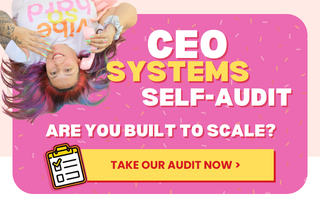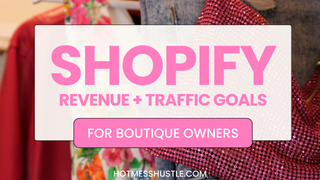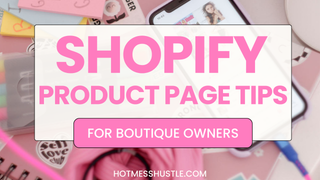Hey boutique owners! Today we're looking at SEO, and debunking some common myths!
Having a basic understanding of SEO will definitely help you with organic traffic, but if you do it badly you could actually end up being penalized by Google. And I’m here to help you avoid that!
For real, there's a lot of information out there, so keep reading to get the low-down on SEO for Shopify!
VIDEO MORE YOUR JAM? WATCH IT HERE:
"You have to do SEO"
🚨 MYTH 🚨
This one is super juicy, and we get asked this question all the time! Do you have to do SEO? Well, here’s the truth: It depends on your business model!
SEO is just one possible way to market your business, and it's not mandatory for your success. So if your Facebook group is your bread and butter and it's bringing in the money, then you must be in your Facebook group, right? But can't do all the things at once.
And here’s the thing. For your website and business in general, you should already be taking some measures that will help with SEO naturally. For example:
- working on your site speed,
- making sure that your website is optimized for both mobile and desktop l
- making sure you have high quality content product descriptions, photos, and
- just making sure that you have a great user experience overall your site, no matter what device.
So make sure you’re doing these things as a minimum, and you will already be working on your SEO!
"I don't have enough traffic to worry about SEO"
🚨 MYTH 🚨
Again... this is false!
SEO is for any size or business, no matter how small!
Why? It’s because leads from organic search are warmer. So when somebody goes on to Google and searches for a particular term, if Google thinks you have the answer and points them to your site, and it turns out you DO have the answer, then this person is going to be more likely to convert because they were actually looking for that thing that they were searching for!
This works at any size of business, and any amount of traffic. Yes, the more traffic you have the better, but SEO will help you build that traffic.
"SEO is too technical"
✅YES and NO❌
So this one is partially true. It can definitely be extremely technical, I won’t lie! Google recommendations can get very technical, particularly their Google PageSpeed Insights. The way to approach this is to keep 👏 it 👏 simple 👏.
All you really need to do is optimise your best product pages: the pages people land on the most. You can get that data from your Shopify dashboard. So focus on those landing pages, optimize them, and make sure they are converting.
Need help optimizing your website to increase your revenue?
That's what we do!
"It’s going to work"
🚨 MYTH 🚨
Again this is false. Now, SEO does work. But the thing is that you have to work at it! This is not a magical quick fix. SEO can take up to 12 months to show results. It’s part of your marketing strategy, and it's a long game marketing strategy at that.
The success of your SEO strategy depends on a number of things, so try these things out first:
- making sure that your site is structurally sound,
- your content is high quality, and
- you're giving your visitors a great user experience.
As boutique owners, we should all be doing this stuff anyway, right? And then look at implementing a well-researched keyword strategy. After this you should see some noticeable results a bit quicker!
"Set and Forget"
🚨 MYTH 🚨
Ok. Can you set it and forget it? This one’s a no, unfortunately! SEO is something you will need to keep working on consistently and constantly. Like any other marketing strategy, it’s never a one off task. There's no checklist of all the SEO tasks that you can do and then you're done with it and then the traffic just comes to you.
And don't trust someone who says they can do it all for you! Never do anything shady like buy backlinks or hire someone who guarantees you backlinks or that guarantees getting you on the first page of Google. If it sounds too good to be true… It probably is!
So know that SEO is going to take some ongoing effort. Google is always improving and updating and so you have to as well. You need to figure out what your audience likes, and what is working in terms of SEO... and just do more of that! Is it trial and error? Sure! But make sure you’re trialing best practice techniques!
"More is More"
🚨 MYTH 🚨
Think you need more content, more products, more pages? Well I’m actually happy to break it to you... this one is also false! And here's why.
Google knows what your site is about. And if you have good copy and content on your site, then Google will want to share that with the people who are looking for it. So these days at least, it’s about quality over quantity. So the best thing to do with SEO is to just be really consistent and really high quality.
If you want to use blogging as a strategy with e commerce, you don't need to be posting a blog daily or even weekly to have an impact on your SEO. It's more about the quality of the blogs that you are putting out. So, a tip here is to focus on your best products or pages and optimize those first.
Pop ups can lower your ranking
✅ TRUE
Okay, so it turns out pop ups can lower your ranking. That’s because they can make your site heavy - and lots of people hate them too, so it can detract from the user experience.
But here’s the thing! Pop ups also work for what they're meant for, right? Pop ups are used to get someone's email address, or to get them to join your Text Club, possibly giving them an incentive to make their first purchase. So you have to weigh it out! What is more important - the SEO score, or the conversion?
Pop ups are just one thing on a long list of things that Google considers. But because Google also knows about your conversions, having pop ups on your site might also end up being a good thing for you for SEO.
So, our tip here is, again, just make sure that you focus on giving a good user experience on your website. Best practice for pop ups is having it delay for at least 45 seconds so somebody can be on your site for a period of time before the pop up appears.
You can outsmart Google with SEO apps
🚨 MYTH 🚨
OK, let’s be clear! You cannot outsmart Google. Even with SEO apps! If you try to, with devious little “black hat” methods, Google will be on to you. So just be authentic with your SEO strategy.
The truth is that there's over 200 ranking factors, according to Google themselves. By design, no one person knows them all. So all you can do here is the best that you can which is quite frankly all you can do with any marketing strategy anyway.
So, just stick to the basics and the best practices and that is enough.
It's also not really possible to automate SEO. The best practice really is to write unique meta descriptions for your pages, and useful product descriptions with alt tags for each product.
Now, if you're on Shopify, there's the actual description and then on the bottom of each product page is a collection page, and there is an SEO area where you can add more there as well.
Having said all that, there is a cool app called SEO manager and it does a couple of things.
1) It can optimize your photos in terms of file size which can affect SEO because of site speed load and overall user experience.
2) It also can automate the process of making sure that your photo tags are in line with your product titles. So that can be helpful too.
It’s all about Keywords
✅YES and NO❌
Ok. Keywords…
So first thing to say, you actually need to do keyword research. There’s no real way around this.
At its most basic level, it's sitting down and thinking about what your customers type into the search engine to find you or the product they want. So you need to come up with a pool of keywords and phrases that your ideal customer would use, and then decide on the top one.
So for example, if you sell an extremely popular brand like CHEWY blue denim, that might be a good one to focus on. HOWEVER! You also want to think about how much competition there is for that keyword. Because if everybody is trying to rank for that keyword, it's going to be harder for you to rank for it.
And on the flip side, if you go too niche that no one is actually searching for it, it doesn't matter if you rank first for it, because no one is going to find you if they're not out there looking for you. So you have to balance these two things: search volume and competition.
Other key points to mention on keywords… Definitely avoid keyword stuffing. An example of this would be overusing the word, using it in inappropriate places so that the meaning is totally distorted (just to use the keyword), and using white text on white background. Google HATES this kind of stuff.
And it’s unnecessary too! On Shopify, there is an SEO section where you can add your keywords. But you don't want to just paste that into every single page! So pick one keyword per page, and don’t repeat them. Each page needs a unique keyword. And if you do this intentionally, Google will see that you’re the expert! So the idea is to use keywords to signal to Google and demonstrate your expertise and authority in that area so that Google recommends you!
Final thoughts 💭💭💭
I know this has been a lot to take in, but I hope this has helped debunk some of the myths and mysteries surrounding SEO! As usual if you've got more questions or need some help with SEO, reach out - we're here for you!
Till next time, cheers!
And if you want a website critique or need more support on strategy - hit us up!






